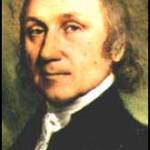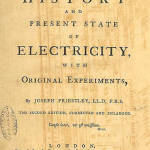I did not know this about Priestley’s significance to two of the great American founding fathers:

“In the 165 letters that passed between Thomas Jefferson and John Adams, the name Benjamin Franklin is mentioned five times, George Washington three times, Alexander Hamilton twice — and Joseph Priestley, a foreign immigrant, is cited no fewer than 52 times.”
Priestley was a founder of the science of chemistry, discovering himself several gases, most notably oxygen. After encouragement from Benjamin Franklin, Priestley worked with electricity and discovered that charcoal conducts electricity.

His radically pro-freedom views in religion and politics led to his History of the Corruptions of Christianity (1782) being officially burned and an angry mob destroying his house and lab in 1791.
Priestley soon moved from England to the United States, where he lived for the rest of life pursuing his scientific, religious, and political studies.
Here is Priestley himself on the relative importance of politics and science:
“The greatest success in [politics] seldom extends farther than one particular country, and one particular age; whereas successful pursuit of science makes a man the benefactor of all mankind, and every age” (from Observations and Experiments on Different Kinds of Air.)
Related: Excerpt on Modernism and the Enlightenment.
Your first quote is from a Publishers Weekly review of “The Invention of Air: A Study of Science, Faith, Revolution, and the Birth of America,” a very interesting book by Stephen Johnson about Priestly and his times.
http://www.powells.com/biblio/1-9781594488528-14
Thank you, John.